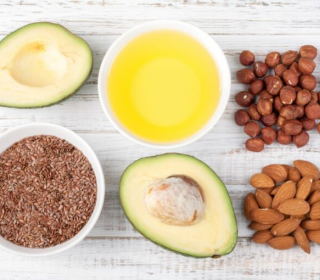The Importance of a High Protein Diet for Fat Loss: 5 Key Reasons

From muscle repair to reduced hunger, Nutritional Therapist Jade Lauren Ellis shares 5 reasons why a high-protein diet can help you lose weight and keep it off
Click here to get a 20-minute nutrition consultation for free. We will discuss your goals, symptoms and expectations.
Nutritionists often recommend protein to help you feel fuller longer and achieve weight loss.
You might have heard about the low-carbohydrate and paleo diets that have gained popularity over the years due to their high protein intake. Both are associated with optimal weight-loss.
Protein is important for weight loss and fat management. Here are five reasons.
Reason #1 Protein reduces appetite & hunger
Protein keeps you feeling fuller for longer. You will feel fuller and more satisfied with more protein.
A high-protein breakfast can control your hunger and curb your appetite in the afternoon.
Researchers found that those who ate more protein for breakfast had lower blood glucose levels and a reduced appetite in the afternoon compared to those who ate less.
A breakfast rich in protein helps control hunger
Protein is important for weight loss because it can reduce appetite and calorie intake throughout the day.

Second, protein promotes muscle growth & repair
The importance of nutrition in enhancing performance is not to be underestimated, both during and after an exercise session. Many studies have shown that eating a lot of protein increases muscle mass.
It has been well documented that consuming protein after resistance training is beneficial, particularly in relation to muscle hypertrophy.
Give your body the building blocks it needs to rebuild and repair muscle
Amino acids are the building blocks of protein. They are essential for building proteins, hormones and neurotransmitters.
After exercising, you can give your body the building blocks it needs to repair and build muscle.
To get enough protein, you can focus on eating dairy, fish and eggs, as well as lean meats, legumes, seeds, nuts and soy.

Why protein helps blood sugar balance
A number of studies have revealed that the effect of protein on blood sugar is negligible. Maintaining a balanced blood sugar level is essential for optimal weight loss and fat loss.
Gluconeogenesis is a process by which the liver produces sugar. Amino acids, the building blocks of proteins, do not speed up sugar release from the liver. Therefore, eating protein has no effect on blood sugar levels.
eating protein does not affect blood sugar levels
Insulin also has a positive effect when protein is consumed. Insulin is needed to help amino acids from protein enter body cells, which can influence muscle function.
According to several studies protein has little effect on blood sugar levels when insulin is readily available.
Why #4: You burn more calories when you eat protein than any other macronutrient
The amount of energy required by your body to digest and absorb the food you eat is called the thermic impact of food (TEF). This means that your body needs more energy to process protein.
The most energy is required to digest protein (20-30% calories are consumed in digesting the protein). The next is carbohydrates (5-10%), followed by fats (0-3%). A higher-protein diet supports fat loss, because the digestion and metabolism of protein are energy-intensive processes.
The most energy is required to digest protein
The TEF is about 10% of the calories consumed by healthy adults on a mixed-macronutrients diet. However, the actual amount you consume will depend upon several factors including your age, the timing of your meals, and the macronutrient composition of your meal, which includes the carbs and fats.
If you burn 2000 calories a day by eating, about 200 will come from food.
READ MORE: Serious About Weight Loss? Part one of 5 rules that you should live by.

Reason #5 Protein keeps you feeling fuller for longer
The body feels sated when you eat protein because it takes longer to digest. Protein can also affect the levels of hormones that are associated with satiety.
The hypothalamus, a part of the brain that is responsible for hormones and weight control, plays a major role. When deciding how much and when to eat, the brain uses different types of data.
It takes longer for protein to be digested than refined carbohydrates
The satiety hormones (appetite-reducing) GLP1, peptideYY, and cholecystokinin are increased when we consume more protein. Your hunger hormone Ghrelin is reduced .
By consuming sufficient protein, you will naturally consume fewer calories, as you will feel satisfied for longer. This will contribute to healthy weight loss and fat management.

Can you have too much protein?
It is important to know that too much protein over time can cause kidney damage.
Consuming a variety of protein foods – animal and plant based – mixed with a healthy diet of whole grains and fruits and vegetables rich in fibre and low in sugar and processed foods is essential.
It is important to consider the entire meal when attempting to lose weight, and not just one macronutrient. Protein has many benefits that contribute to weight loss and fat loss.










